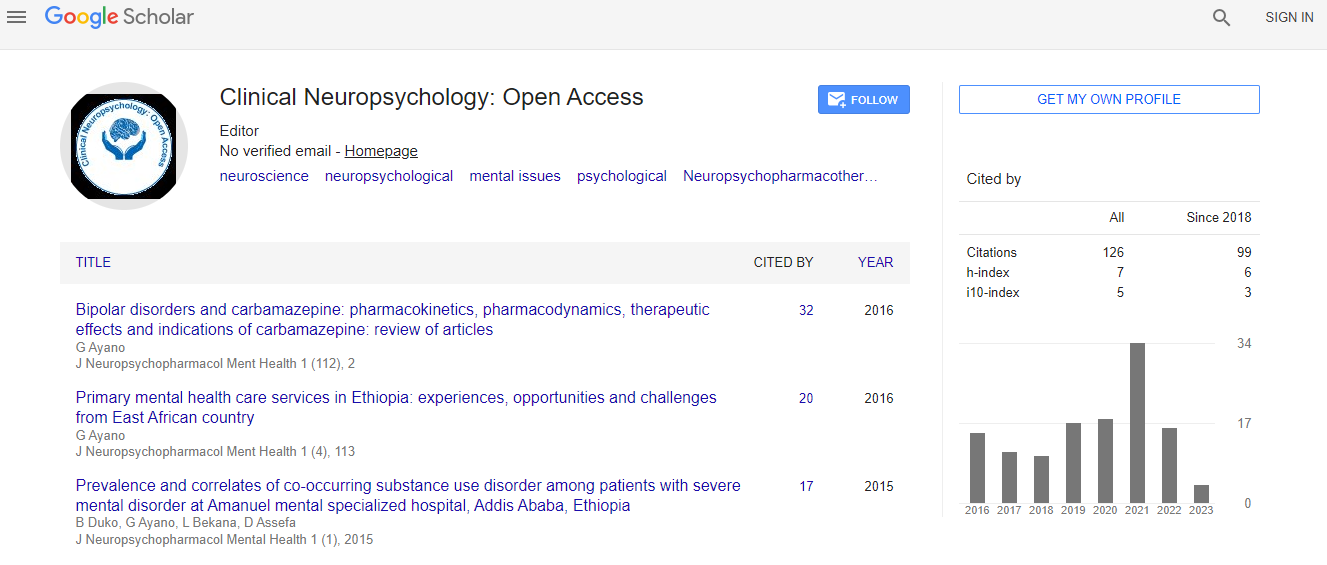Our Group organises 3000+ Global Conferenceseries Events every year across USA, Europe & Asia with support from 1000 more scientific Societies and Publishes 700+ Open Access Journals which contains over 50000 eminent personalities, reputed scientists as editorial board members.
Open Access Journals gaining more Readers and Citations
700 Journals and 15,000,000 Readers Each Journal is getting 25,000+ Readers
Google Scholar citation report
Citations : 141
Clinical Neuropsychology: Open Access received 141 citations as per Google Scholar report
Indexed In
- Google Scholar
- RefSeek
- Hamdard University
- EBSCO A-Z
- OCLC- WorldCat
Useful Links
Recommended Journals
Related Subjects
Share This Page
Alcohol exposure suppresses neural crest cells generation and differentiation during early chick embryo
8th Global Experts Meeting on Advances in Neurology and Neuropsychiatry
Ping Zhang
Jinan University, China
Posters & Accepted Abstracts: ClinNeuropsychol
Abstract
It is now known that excess alcohol consumption during pregnancy can cause Fetal Alcohol Syndrome (FAS) in which several characteristic craniofacial abnormalities are often visible. However, the molecular mechanisms of how excess ethanol exposure affects Cranial Neural Crest Cells (CNCCs), the progenitor cells of the cranial skeleton, is still not clear. In the study, we investigated the effects of ethanol exposure on CNCCs migration both in early chick embryo and in vitro explant culture. First of all, we demonstrated that ethanol treatment caused alizarin red-stained craniofacial developmental defects including parietal defect. Second, immunofluorescent staining with neural crest special markers indicated that CNCCs generation was inhibited by ethanol exposure. Double immunofluorescent stainings (Ap-2α/PHIS3, HNK1/BrdU and AP-2α/c-caspase3) revealed that ethanol exposure inhibited CNCCs proliferation and increased apoptosis. In addition, it inhibited NCCs production by repressing the expression level of key transcription factors which regulate neural crest development by altering expression of Epithelial-Mesenchymal Transition (EMT)-related adhesion molecules in the developing neural crests. In sum, we have provided experimental evidence that excess ethanol exposure during embryogenesis disrupts CNCCs survival, EMT and migration, which in turn causes defective cranial bone development.Biography
Ping Zhang is a graduate student in Jinan University, China, currently working in the Key Laboratory for Regenerative Medicine of the Ministry of Education and Division of Histology & Embryology. Maintaining a high degree of enthusiasm and professional research attitude, she is been devoted into the program “Alcohol exposure induces chick craniofacial bone defects by negatively affecting cranial neural crest development” and has published the research results on Toxicology Letters.
E-mail: Zhangping_a_a@126.com

 Spanish
Spanish  Chinese
Chinese  Russian
Russian  German
German  French
French  Japanese
Japanese  Portuguese
Portuguese  Hindi
Hindi 